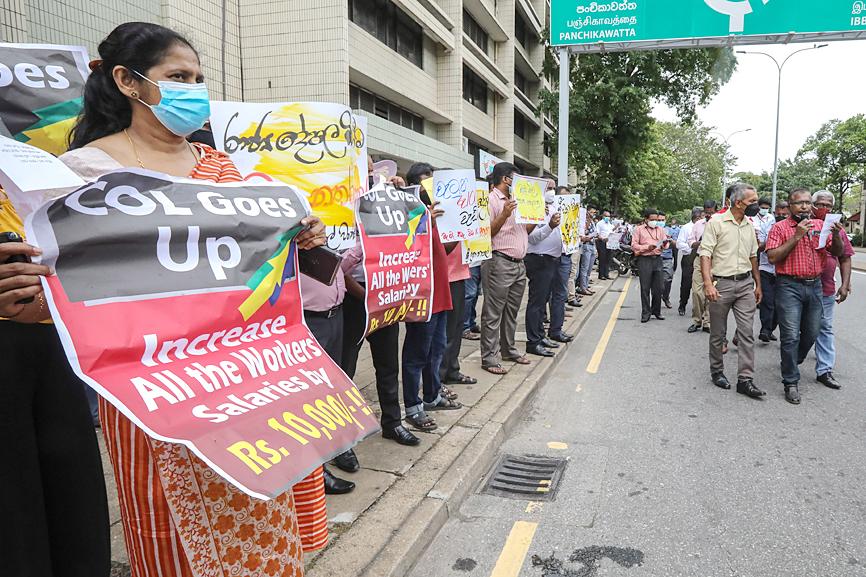The Sri Lankan government yesterday threatened to freeze the bank accounts of Sri Lankans working overseas who send money back to the country using informal money changers, as depleted foreign exchange reserves drive a thriving black market for US dollars.
The COVID-19 pandemic has wreaked havoc on the island’s economy, and the government has banned imports of food, vehicles and other items in an effort to shore up its stockpile of foreign currency.
These restrictions have led to severe shortages of food, cooking gas and cement, and Sri Lanka was forced to shut its only oil refinery last month, as it ran out of US dollars to import crude.

Photo: EPA-EFE
The official exchange rate of 202 rupees to the US dollar, offered by commercial banks that have run out of foreign currency, is well below the 240 rupees to 245 rupees offered by informal money changers now in the Sri Lankan central bank’s crosshairs.
Central Bank of Sri Lanka governor Ajith Nivard Cabraal said that migrant workers and others would face consequences if they sent their earnings home outside of official channels.
“Bank accounts of those who distribute and receive #money through #unlawful money transmission methods will be frozen with immediate effect,” Cabraal wrote on Twitter.
He added that the central bank “urges all #migrant Sri Lankans to use only #legal channels to #repatriate their earnings.”
The bank has also offered to pay a 10 rupee incentive to overseas workers who send money back through official channels, up from 2 rupees before.
Sri Lanka is struggling to service its foreign debt, and foreign exchange reserves had fallen to US$2.26 billion at the end of October, about one-third of the levels when a new administration took office two years ago.
Ratings agency Moody’s Investors Service in October downgraded Sri Lanka’s foreign debt rating, and the government last month unveiled a drastic austerity budget in an attempt to rein in its runaway deficit.
Central bank officials have said that the country is facing its worst foreign exchange crisis since the advent of a free economy and have demanded all exporters turn over their foreign exchange earnings to the government within six months.
Sri Lanka recorded its worst ever economic performance last year with a 3.6 percent contraction, fueled largely by the fallout from the pandemic on tourism.

Taiwanese suppliers to Taiwan Semiconductor Manufacturing Co. (TSMC, 台積電) are expected to follow the contract chipmaker’s step to invest in the US, but their relocation may be seven to eight years away, Minister of Economic Affairs J.W. Kuo (郭智輝) said yesterday. When asked by opposition Chinese Nationalist Party (KMT) Legislator Niu Hsu-ting (牛煦庭) in the legislature about growing concerns that TSMC’s huge investments in the US will prompt its suppliers to follow suit, Kuo said based on the chipmaker’s current limited production volume, it is unlikely to lead its supply chain to go there for now. “Unless TSMC completes its planned six

Intel Corp has named Tasha Chuang (莊蓓瑜) to lead Intel Taiwan in a bid to reinforce relations between the company and its Taiwanese partners. The appointment of Chuang as general manager for Intel Taiwan takes effect on Thursday, the firm said in a statement yesterday. Chuang is to lead her team in Taiwan to pursue product development and sales growth in an effort to reinforce the company’s ties with its partners and clients, Intel said. Chuang was previously in charge of managing Intel’s ties with leading Taiwanese PC brand Asustek Computer Inc (華碩), which included helping Asustek strengthen its global businesses, the company

Power supply and electronic components maker Delta Electronics Inc (台達電) yesterday said second-quarter revenue is expected to surpass the first quarter, which rose 30 percent year-on-year to NT$118.92 billion (US$3.71 billion). Revenue this quarter is likely to grow, as US clients have front-loaded orders ahead of US President Donald Trump’s planned tariffs on Taiwanese goods, Delta chairman Ping Cheng (鄭平) said at an earnings conference in Taipei, referring to the 90-day pause in tariff implementation Trump announced on April 9. While situations in the third and fourth quarters remain unclear, “We will not halt our long-term deployments and do not plan to

The New Taiwan dollar and Taiwanese stocks surged on signs that trade tensions between the world’s top two economies might start easing and as US tech earnings boosted the outlook of the nation’s semiconductor exports. The NT dollar strengthened as much as 3.8 percent versus the US dollar to 30.815, the biggest intraday gain since January 2011, closing at NT$31.064. The benchmark TAIEX jumped 2.73 percent to outperform the region’s equity gauges. Outlook for global trade improved after China said it is assessing possible trade talks with the US, providing a boost for the nation’s currency and shares. As the NT dollar